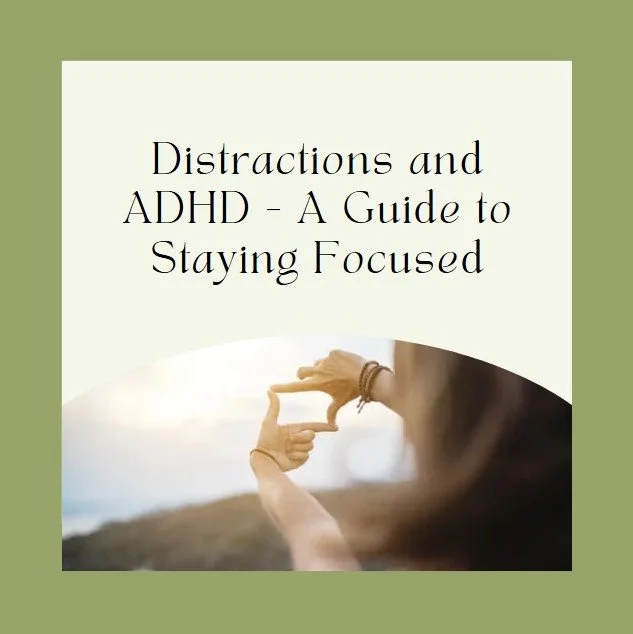Distractions and ADHD - A Guide to Staying Focused
Distractions are an unavoidable reality in the hustle and bustle of everyday life, however for individuals with Attention-Deficit/Hyperactivity Disorder (ADHD), these distractions can be particularly disruptive! ADHD affects the brain's executive functions, which include attention, focus, and impulse control. This can lead to increased susceptibility to distractions, both external and internal.
External distractions
These are stimuli from the surrounding environment that divert attention away from the task at hand. Examples include:
Visual stimuli: Movement, clutter, bright lights, notifications on electronic devices, and other visual elements can also capture attention and disrupt focus.
Interruptions: Phone calls, text messages, emails, social media notifications, and people entering the room can all interrupt workflow and break concentration.
Noise: Conversations, traffic, music, television, construction sounds, and other auditory stimuli can be particularly distracting for individuals with ADHD.
Technology: The constant stream of information and notifications from smartphones, tablets, and computers can be a major source of distraction.
Internal distractions
These originate from within the individual and can be just as disruptive as external distractions. Examples include:
Racing thoughts: A constant stream of thoughts and ideas can make it difficult to stay focused on the present moment.
Daydreaming: Fantasizing or letting the mind wander can lead to decreased productivity and missed deadlines.
Emotional fluctuations: Intense emotions, such as anxiety, stress, or excitement, can hijack attention and make it challenging to concentrate.
Physical sensations: Hunger, thirst, fatigue, pain, and other bodily sensations can also distract from the task at hand.
Impact of Distractions
The impact of distractions can be far-reaching, affecting various aspects of life, such as:
Productivity: Difficulty completing tasks, meeting deadlines, and staying organized which can lead to frustration and a sense of underachievement.
Work life: Struggles with maintaining attention during meetings, completing work assignments, and managing time effectively which can negatively impact job performance and career advancement.
Academic performance: Challenges in staying focused during lectures, taking notes, and studying can result in poor academic performance.
Relationships: Difficulty listening, engaging in conversations, and remembering important details can strain relationships with family, friends, and romantic partners.
Emotional well-being: Increased frustration, stress, anxiety, low self-esteem, and feelings of inadequacy can take a toll on emotional health and overall well-being.
Good News!
The good news though, is that with a bit of strategy and self-compassion, you can create an environment that supports focus and minimizes distractions. Here are some practical approaches that can help transform distractions into stepping stones toward meaningful focus.
Start with Awareness
The first step is understanding your triggers. What tends to pull your focus away? Is it an avalanche of thoughts, your phone, or background noise? Spend some time observing your environment and identifying the patterns that derail you. Awareness is the foundation for creating lasting changes.
Structure Your Environment
A cluttered space can lead to a cluttered mind. Minimize distractions in your physical and digital environment:
Declutter your workspace so only the essentials are within reach.
Use apps or browser extensions to block distracting websites and notifications during focus periods.
Consider noise-canceling headphones or white noise to drown out background chatter.
Break Tasks into Bite-Sized Pieces
A big task can feel overwhelming, and the overwhelm can lead to procrastination. Break your goals into smaller, manageable steps. Tackling one step at a time makes progress feel achievable and helps keep distractions at bay. Celebrate small wins to fuel sustained motivation.
Embrace the Power of Routine
Building routines can add a sense of order and predictability to your day. Try setting a fixed time for work, rest, meals, and exercise. Whether it's a morning ritual to kickstart your energy or a wind-down routine to calm your mind, these habits help reduce decision fatigue and create a sense of stability.
Leverage Tools and Timers
Tools like to-do lists, planners, or digital reminders can be lifesavers for ADHD brains. Time management techniques like the Pomodoro Technique, where you work for 25 minutes and then take a short break, can help sustain focus while giving your brain the breather it needs.
Harness Your Unique Energy
ADHD isn’t solely a challenge - it’s also a source of creative energy and passion. Redirecting this dynamism can bring unexpected benefits:
Innovative Thinking - sometimes, distractions lead to innovative ideas. Keep a notebook or digital app handy to jot down insights that arise during your breaks. You can revisit these sparks of creativity later.
Experiment & Adapt - not every strategy works for everyone. Be open to testing different techniques and iterating on your approach. What works one day might need tweaking the next.
Practice Self-Compassion
Nobody is focused 100% of the time, and that's okay. ADHD is a part of who you are, and it’s essential to approach yourself with kindness. Celebrate small victories, learn from setbacks, and remember: progress is more important than perfection.
Ask for Support
Sometimes, the journey is easier with help, and support systems such as friends, family or through ADHD life coaching can offer perspective, encouragement, and strategies tailored to your unique needs. So, don't hesitate to reach out for help.
Conclusion - Your Path Forward
Distractions may always be a part of life, but when you have ADHD, managing distractions is about crafting a life that honors how your mind works. It’s not a matter of trying to force conventional focus but rather of embracing your natural rhythms and finding creative ways to work with them. As you experiment with these strategies and develop your own personalized system, you’ll not only improve your productivity but also cultivate a deeper sense of self-acceptance.
Your turn - What small change will you experiment with today?
Remember, the journey itself holds as much value as the destination.
If you’d like me to journey with you, then send me a message or book a complimentary call today!


